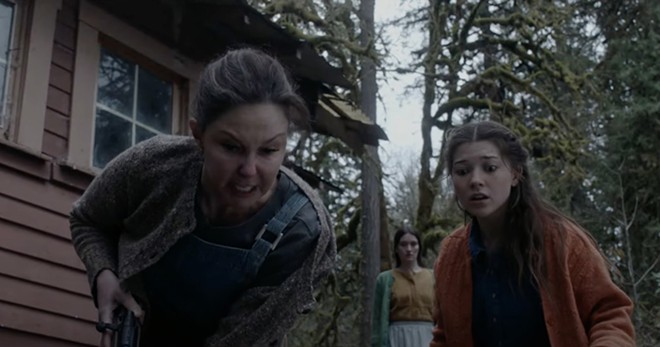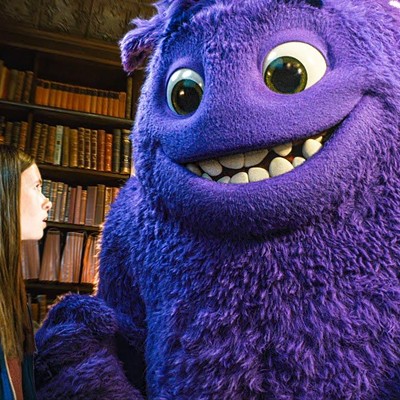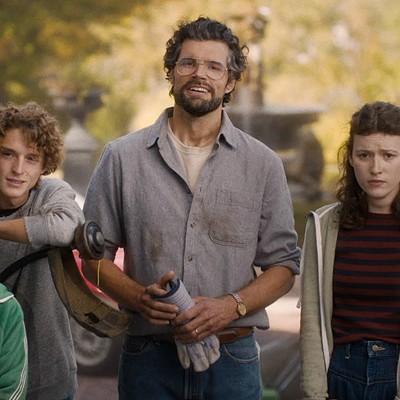Curious pacing mars Kingdom
For a tentpole movie, Wes Ball's Kingdom of the Planet of the Apes is a rather daring film that in some ways plays against "apectations" (sorry, couldn't resist...). Deliberately paced, at times it seems as if the director is daring us to stay interested in this, the 10th film in the enduring franchise. Granted, the movie does right itself and proves worthwhile, serving as an effective metaphor for our own societal issues, yet it takes a bit too long to get there and will likely prove too tedious for some.
Noa (Owen Teague) is a member of a chimpanzee tribe that specializes in raising and training eagles. They're a peaceful, rather meek group, ripe for exploitation. Unfortunately, that's exactly what happens when a group of militant gorillas invades their camp, destroys it and takes its citizens away as slaves. Thought killed during the attack, Noa survives and sets out to find his fellow villagers. On his trek he receives help from Raka (Peter Macon), an elderly orangutan and a human, Mae (Freya Allen), who seems to be smarter and more tenacious than her brethren.
The film takes an intriguing turn with the introduction of Proximus Caesar (Kevin Durand), a would-be despot who rules with an iron hand, though he portrays himself as an ape with a vision that will benefit all simians. He proves to be the most intriguing character as his intentions are not without merit. Having been taught the theory of evolution by the opportunistic human Trevathan (William H. Macy), he wants to take steps to ensure apes develop in order to maintain control over the humans. This is not an unreasonable line of thinking and not without its appeal. After all, humans once subjugated them and, in effect, created the conditions of their apocalypse. Why not let the simians have a go at it?
All that being said, the film is an astounding visual achievement. Peter Jackson's Weta FX company continues to astound with the motion-capture technology it employs. Continued modifications have made the digital transformation of human actor to ape character even more astounding than before. The realism of the chimps and gorillas' movements and expressions are a wonder to behold, as are the world-building effects employed. The melding of real locations and sets with the digital backgrounds is seamless and given to intriguing and, at times, awe-inspiring sights. LAX and the planes surrounding it overgrown with vegetation is a hoot while a rusted-out oil tanker converted into an ape city begs further examination, its minute details too much to take in at a glance.
Kingdom is far from a bad movie, but rather one that requires an adjustment in expectations. This is a thoughtful genre exercise intent on tackling serious issues, its final sequence portending not just more sequels but further discourse on how any society should be run. As such, it's a bit of an anomaly where summertime Hollywood fare is concerned. Ball and screenwriter Josh Friedman should be commended for taking such a tact. I just wish they'd gotten to the crux of their story a bit sooner. In theaters.
Déjà vu haunts bland Mother
I'd be hard pressed to think of one original thing in Mark Waters' Mother of the Bride, a tepid, by-the-numbers rom-com that, despite its blandness was likely a pleasant experience for all involved. Shot in Phuket, Thailand, the tropical region provides a stunning backdrop for this languid effort. If nothing else, the film may increase tourism to the region. Beyond that...
Believing that it is a small world after all is the key to buying into the premise. Emma and RJ (Miranda Cosgrove and Sean Teale) get engaged and plan on getting married in a month. Problem is, what with them being in London and her mother, Lana (Brooke Shields), in California, Emma hasn't gotten around to mentioning that she is dating anyone, let alone on the cusp of being married.
Money is no object where the nuptials are concerned, so off to Thailand we go where Lana meets RJ's father Will (Benjamin Bratt) who, get this, was her ex-boyfriend from college who broke her heart! Awkward! Will an old spark be rekindled? Will misunderstandings occur that will ruin this reunion? Will I repeatedly check my phone to see what time it is while watching this stultifyingly dull movie?
The lack of originality is exacerbated by numerous pratfalls and sloppy scenes of slapstick which adds to the air of desperation that permeates the production. Seeing the two leads accidentally fall into a pool not once, but twice, speaks to the hopeless nature of this enterprise. Other trips and falls ensue as do other embarrassing situations (Will walks out of the shower, not knowing Lana is the next room!), present simply to pad the 90-minute running time.
While Shields and Bratt are capable actors, there's little spark between them. Their scenes are labored, lacking in urgency or mirth. Though somewhat different in premise, the dynamic in 2022's Ticket to Paradise between George Clooney and Julia Roberts was much the same. And yet, those two screen veterans make that film endurable and at times, amusing.
That being said, I doubt Clooney and Roberts could have salvaged this Frankenstein-like script by Robin Bernheim. The numerous, tattered situations she stitches together here have been used so often they're incapable of being rejuvenated. In the end, Bride ends up being as forgettable as it is derivative. Streaming on Netflix.
Lazareth: Apocalypse, again
Guess what? It's the end of the world again, a premise that's been covered ad nauseum where movies are concerned, but it doesn't stop Alec Tibaldi from tackling the premise one more time in Lazareth, a derivative exercise that brings nothing new to the apocalyptic film genre. Though it contains two strong performances from a pair of promising young actresses, this proves to be a repetitive exercise that only succeeds in reminding us of better movies.
In the outskirts of Seattle, Lee (Ashley Judd) has carved out an existence with her two nieces, Maeve and Imogen (Sarah Pidgeon and Katie Douglas, respectively). Living off the land, they have cobbled together a life that is peaceful but it's not without its dangers. Lee periodically goes into town to scavenge for supplies, returning with tales of how horrible conditions are, instilling a sense of dread in the girls. Restricted to the immediate area around their home, the girls are completely unaware of what the outside world is like.
One day on an excursion to gather herbs, Maeve stumbles upon a wounded young man. Astounded by the sight, she shares her discovery with her sister and the girls bring their unconscious new friend to their home, hiding him in the basement away from their aunt. Obviously, this is a plan destined to fail and once Lee discovers their new boarder, she's less than pleased. Yet, the trio nurses Owen (Asher Angel) back to health, his presence becoming a distraction in more ways than one.
The sheltered nature of the sisters' upbringing prompts a curiosity in the pair that their aunt's stories of violence and danger can't quash. And as Owen heals and proves he's not a threat, Maeve and Imogen begin to look at him in a different light, their simultaneous sexual awakening resulting in a rivalry that takes an unexpected turn.
Speaking of plot twists, Tibaldi throws the viewer a curveball at the beginning of the third act, not an overly original development but one that casts all that has happened in a different light. Unfortunately, like so many elements in the script, its more intriguing possibilities aren't explored. This is especially glaring where Lee is concerned. We get little information about her background, which is fertile narrative ground. Bitter, condescending and paranoid, it's obvious events have occurred in her past that have caused her to deal with their situation in the way she does.
It's unfortunate this isn't explored as Judd is forced to give a grating, one-note performance which consists of simply displaying varying degrees of anger. To be sure, Tibaldi is sincere in delivering his message on the dangers of isolationism. However, this theme has been explored many times before, rendering Lazareth unnecessary. Available via Video-On-Demand.



















